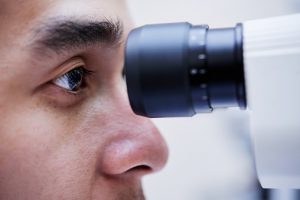 Glaucoma is a disease of the eye characterized by elevated intraocular pressure. It’s the most common cause of irreversible blindness. The condition has previously been associated with an increased incidence of depression as a result of the treatment, in the form of beta blocker eye drops.
Glaucoma is a disease of the eye characterized by elevated intraocular pressure. It’s the most common cause of irreversible blindness. The condition has previously been associated with an increased incidence of depression as a result of the treatment, in the form of beta blocker eye drops.
Researchers have speculated that another reason for this association may be the increased levels of stress glaucoma patients must cope with. Patients will have to face the knowledge that they’ll lose their sight permanently, experience the anxiety of blindness, continue with medical follow-ups for (most likely) the rest of their life, and manage the increased financial burden associated with blindness.
Advertisement
Therefore, it may come as no surprise that a higher incidence of depression has been recorded among patients with glaucoma than those who do not have the condition. Certain questions still remain unanswered in the currently published research, but a newly released study hopes to resolve them.
The first is the small sample size traditionally associated with these studies. Second is the timeline between development and diagnosis of glaucoma and the concurrent diagnosis of depression in those patients. The new study followed a population-based sample for a period of 11 years.
The data were collected from the Taiwan National Health Insurance Research Database. The participants included 8,777 glaucoma patients and 35,108 controls without glaucoma, matched by age and sex. The participants provided follow-up data for 11 years. The incidence of depression was diagnosed by psychiatrists under the standardized criteria for the illness. Patients, both glaucoma and control, were excluded from the study if they had been diagnosed with depression prior to the outset of the data collection.
Rates of Depression Almost Double in Glaucoma Patients
After analyzing the data collected, the researchers found that compared to the control group at 3.2 percent, the participants diagnosed with glaucoma showed a significantly higher rate of depression, with 5.9 percent of the glaucoma population diagnosed with depression at the end of the follow-up period. The mean age for glaucoma patients in this study was much younger than the international average, indicating the possibility that the condition could be diagnosed sooner.
Among the glaucoma patients, additional risk factors for developing depression were identified as age, sex (females were more likely to be diagnosed with depression), lower income, living alone, and substance abuse. They did not find, however, that beta blockers or other topical treatments were associated with an increase in the incidence of depression among the glaucoma patients.
Advertisement
This study is one of the first to use certified doctors and medical practitioners to diagnose patients with glaucoma and depression. Previous research has used self-reported questionnaires as the baseline for these conditions, lowering the validity of the findings. This study found that social and familial support systems were important factors in the diagnosis for depression and that those living on their own or without these supports were at a greater risk of the condition.
Overall, this study confirms the finding that glaucoma patients are at a higher risk for depression, in a large sample size, which represents the population of Taiwan.
Also read:
- Glaucoma vs. Cataract: Difference in Causes, Symptoms, and Treatment
- Glaucoma: Natural home remedies and diet
- Neovascular Glaucoma (NVG): Causes, Symptoms, and Treatment
- How to treat catatonic depression? Symptoms and causes
